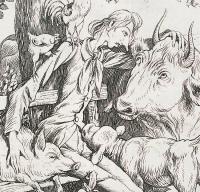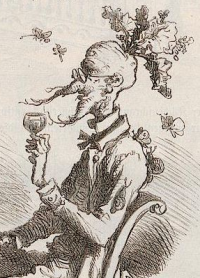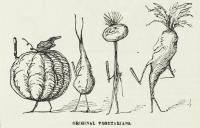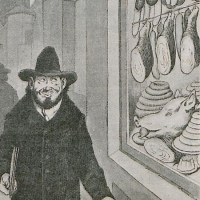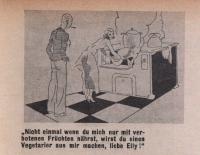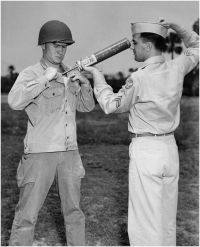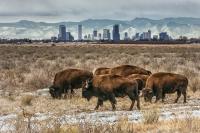Show search results for
Einführung in die Ausstellung | Fleischloser Humor
Since the mid-nineteenth century, vegetarianism and veganism have attracted public attention and provoked controversial discussions in Europe. The exhibition traces the development of the discourse on vegetarianism in caricatures, satirical drawings and poems that mock the movement, its worldview, social structures, and eating habits. This is from the German version of “Satirical Glimpses of the Cultural History of Vegetarianism.” For the English-language version of this exhibition, click here.
„Du bist, was du isst“ – Dummes Gemüse und der Reiz des Neuen und Anderen | Fleischloser Humor
While English satire magazines mocked vegetarianism since the 1840s, the first German caricatures appeared some 30 years later. Early drawings often imagined that a vegetarian would gradually transform into a plant. Other recurring topics are the assumed correlation between (meatless) nutrition and (peaceful, fragile) physical appearance and character, as well as the debate over whether a meat-rich or a meat-free diet was better for human health. This is from the German version of “Satirical Glimpses of the Cultural History of Vegetarianism.” For the English-language version of this exhibition, click here.
Mensch, Tier und Natur – Vorstellungen natürlicher, harmonischer (Ko-)Existenz | Fleischloser Humor
In the nineteenth century, there was much debate about the question of which way of living could be regarded as “natural.” Caricatures on vegetarianism mock ideas of the “natural” relationship between animal and man, and draft utopian as well as dystopian visions of a vegetarian future. This is from the German version of “Satirical Glimpses of the Cultural History of Vegetarianism.” For the English-language version of this exhibition, click here.
Fleischverbot: Lust und Frust, Askese und Doppelmoral | Fleischloser Humor
Since vegetarian societies began to spread and organize events in Germany, their missionary attitude and their supposed moral superiority have been ridiculed. Caricatures mocked the rigid rules of the vegetarians and their societies, accusing them of hypocrisy or of reinterpreting the self-imposed prohibitions according to their own needs and weaknesses. This is from the German version of “Satirical Glimpses of the Cultural History of Vegetarianism.” For the English-language version of this exhibition, click here.
Zeitgemäßer Lebensstil: Soziale Normen und Reformen | Fleischloser Humor
In the early phase of the vegetarian movement, satirists playfully imagined how this diet and worldview affected different aspects of culture. Other cartoons make fun of the fact that vegetarianism quickly became a trend that was seen as sign of the Zeitgeist of the 1880s. Surprisingly, they overlooked the fact that vegetarianism was indeed intended as a sociocultural reform that could contribute to social and gender equality. This is from the German version of “Satirical Glimpses of the Cultural History of Vegetarianism.” For the English-language version of this exhibition, click here.
“Yanqui Cotton Patch”: US Development Aid and Pesticide Use in Nicaragua
This article explores the impact of extensive pesticide use in Nicaragua after World War Two.
Silent Spring on Television | Rachel Carson’s Silent Spring
This is Chapter 6 of the exhibition “Rachel Carson’s Silent Spring: A book that changed the world” by historian Mark Stoll.
Cosmology of the Ergene River Pollution
This article investigates the pollution of the Ergene River as an outcome of the hegemonic cosmology in Turkey.
Resistance in the Midst of the Anthropocene: The Rise and Fall of Artificial Earthquakes at the Rocky Mountain Arsenal, 1962–1966
This article explores the materialization of the Anthropocene at the local level.


